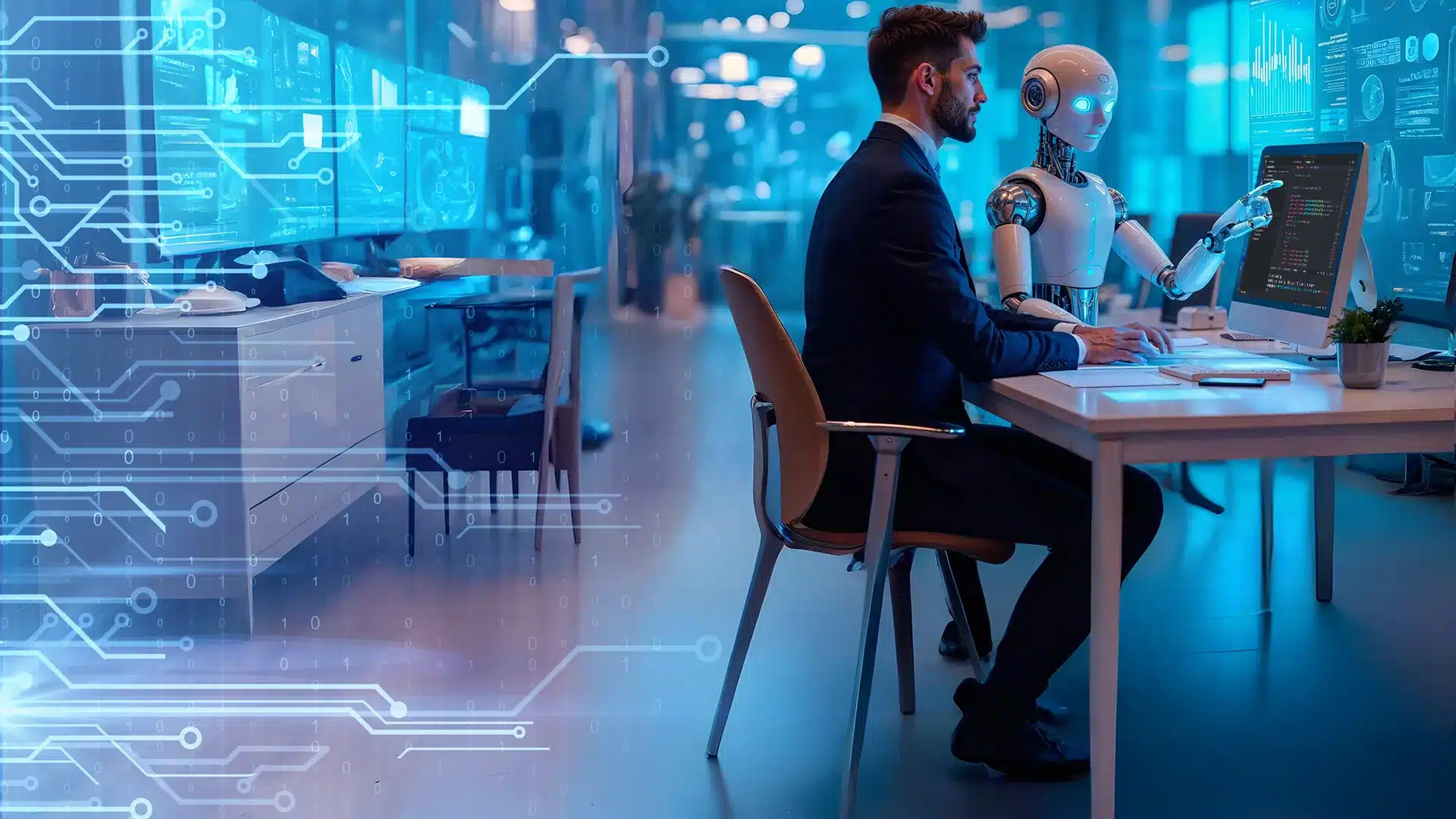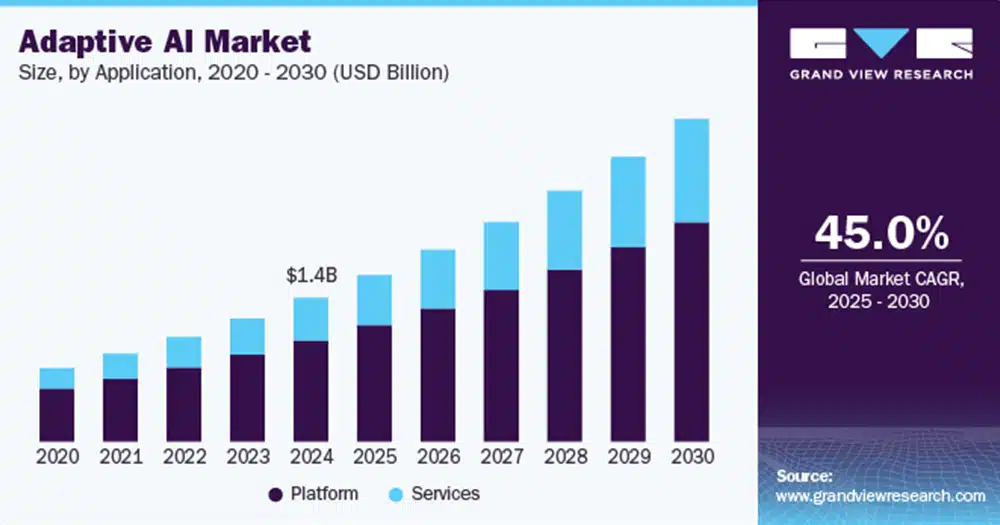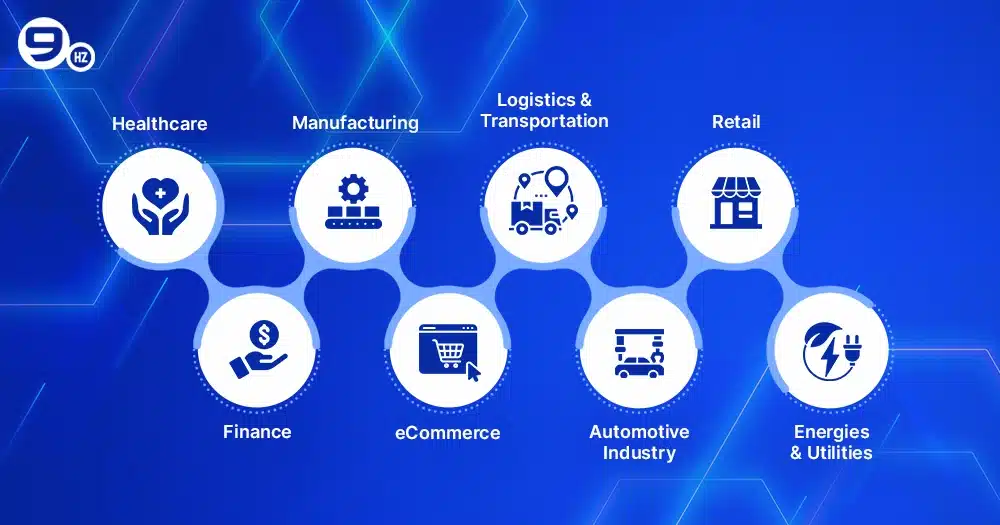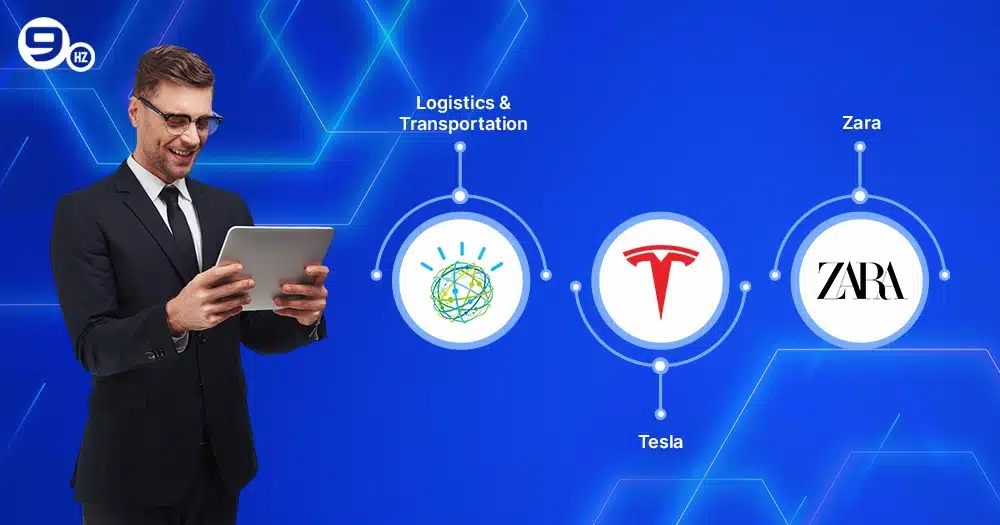Artificial intelligence has come a long way in automating business processes while increasing operational efficiency. However, doesn’t it sound too vague that this highly smart technology still relies on manual updates to learn new data about business and customers? Well, it’s no longer the case. As a leading adaptive AI development service provider, we have been providing smart solutions that are capable of continuously learning about their customers, gaining new insights about the businesses, and providing personalized responses accordingly.
Adaptive AI applications continuously learn and thus improve their performance via continuous user interaction, unlike traditional AI solutions that entirely rely on manual updates. The adaptability allows the solution to produce better and more accurate results by assessing the user input. According to Grand View Research, the global adaptive AI market is valued at USD 1,013.2 million in 2024, which is all set to exhibit a CAGR of 2.8% to achieve the valuation of USD 1,607.0 million by 2030.
Having a glance at an adaptive AI example can be a great way to understand the new technology and implement it into your business operations. Therefore, this blog will discuss adaptive AI use cases in different types of businesses, real-world implementations, and how you can embrace the power of this technology.
What is Adaptive AI? (Definition & Characteristics)
Let’s begin with understanding adaptive AI. It is a form of artificial intelligence technology that can adapt, learn, and make improvements. Whether it is learning from the environment, user interactions, or the data, everything is executed automatically.
Traditional technology, on the other hand, significantly relies on manual updates and data training to feed the new information to the system. Adaptive AI applications can even modify their behavior and tone according to the particular user behavior and nature of the query.
This core competency of the technology makes adaptive AI more versatile for a wider range of industries and businesses. That’s why it makes sense for businesses seeking smart, self-improving systems tailored to their needs to partner with an adaptive AI development company.
Characteristics of Adaptive AI Technology
- Continuous Learning: The adaptive AI solutions are designed to continuously learn, analyze new information, identify patterns, and thus enhance their performance over time.
- Adaptability: As the terminology itself suggests, adaptive AI makes it easier to understand the buying behavior and queries of customers to provide personalized responses by adapting to their personality.
- Self-improvement: Adaptive AI examples like ChatGPT have a unique core competency of continuously improving their performance by learning through user interaction, collecting data from the live environment, and much more.
- Problem-solving capabilities: Adaptive AI use cases consist of the nuanced approaches to different types of problems. It increases their ability to solve complex problems and offer innovative solutions.
Top 8 Adaptive AI Use Cases Across Industries
As interpreted in the earlier section, adaptive AI is a versatile concept that enables all types of businesses to enhance their operations while establishing stronger connections with their stakeholders. Categorizing the adaptive AI use cases on the basis of industries and particular domains can help with better understanding and implementation.
1. Healthcare
a. X-ray and Visual Screening
Adaptive AI solutions are trained to read and analyze the relevant visuals, like X-rays and MRIs, to identify the chances of diseases and fractures. Adaptive AI allows the system to learn about the patient’s medical history and consider all the factors to produce accurate results.
b. Personalized Treatment Plans
It allows for personalizing the treatment plan for patients according to their lifestyle, eating habits, and overall medical conditions. Thus, the recovery speed of the patient can be increased without overdosing on the medicines, as well as eliminating the chances of side effects.
c. Faster Drug Discovery
Adaptive AI examples are also helpful in the medical industry for drug discovery and accelerating the development of new medicines. Moreover, the chances of human errors and inaccurate concentration of the drugs are also eliminated.
Real-life use cases
Mayo Clinic Collaborated with Google Cloud- Mayo Clinic and Google Cloud came into a partnership to build an AI and machine learning platform that could learn about the patient’s medical history to assist in personalized care and research. The solution is proven highly efficient in assessing breast cancer risks and enabling quicker treatment.
2. Finance
a. Active Fraud Monitoring
The finance sector has always been concerned about security and fraud detection due to the chances of high monetary losses. So, Adaptive AI allows the financial institutions to actively monitor the systems, identify the anomalies, and confirm the chances of a cyber attack even before it happens.
b. Personalized Product Suggestion
It becomes much easier for the insurance and finance companies to analyze the buying behavior and preferences of their customers to sell them more relevant insurance plans and finance services.
c. Legal Compliances
Adaptive AI applications, when integrated into the system, keep track of changing rules and regulations from the state and central government. So, it makes sure that all the operations comply with dynamic regulatory requirements.
Real Life Use Case
Equifax Analyze Loan Applications- Equifax is a financial entity that offers consultation and access to financial services to its customers. The company has been using adaptive AI to monitor its clients’ financial decisions over the past 2 years. Based on the data, they have sanctioned 92,000 more loans without bearing any losses.
3. Manufacturing
a. Inventory Management
Adaptive AI allows manufacturing companies to continuously monitor the market trends and predict the demand for products for the upcoming sessions. Thus, it becomes easier for the manufacturing units to control production to avoid the chances of stockouts and overstocks.
b. Enhanced Quality
Adaptive AI examples also ensure the accurate quality testing of production by monitoring the signs of damage, malfunction, and missed products. Such type of products are instantly removed from the distribution chain.
c. Frequent Maintenance
The innovative solutions are highly helpful in tracking the equipment’s performance and identifying the need for maintenance. This way, frequent maintenance of machinery is ensured to reduce the chances of failure as well as avoid bigger expenses.
Real Life Use Case
Rockwell Automation- The company has manufactured an Asset Risk Predictor that helps to identify anomalies, boost OEE, and thus plan the maintenance of machines in advance with higher precision.
4. eCommerce
a. Personalized Recommendation
Adaptive AI applications learns about the purchasing habits of the customers, their lifestyle, and spending capabilities. This information is then used by the system for personalized marketing to show the ads of relevant products and services, ultimately increasing the chances of successful sales.
b. Dynamic Pricing
Pricing plays a core role in determining the price of products according to existing competition. So, adaptive AI use cases also consist of adjusting the product prices according to the peer businesses. Thus, neither do the overall profit margins have to be compromised, nor do the businesses lose valuable customers due to price differences.
c. Advanced Strategizing
The core competency of adaptive AI is that it continuously tracks the market trends and thus allows the eCommerce businesses to shape their operational strategies, which are more effective and align with the target audience.
Real Life Use Case
Amazon Using Personalized Recommendation- The e-commerce giant Amazon has implemented adaptive AI technology into its operations to offer personalized product recommendations to its customers.
5. Logistics & Transportation
a. Route Optimization
Adaptive AI gathers the real-time information about weather, traffic, and road conditions. Thus, it suggests the best routes for transportation that increase safety while minimizing the delivery time and fuel consumption.
b. Demand Forecasting
The innovative solutions play a vital role in demand forecasting by learning from the historical data, customer orders, and seasonal trends. Thus, it can help to predict the demand for the fleet in upcoming sessions to keep the resources ready.
c. Fleet Maintenance
Similar to machine maintenance, adaptive AI applications also help in monitoring vehicle performance and thus signal the maintenance requirements. It helps to prolong the vehicle’s lifespan while eliminating the chances of breakdowns.
Real Life Use Cases
DHL Using AI for Routing- One of the biggest logistics companies, DHL, trusts the adaptive AI applications to determine the most efficient and clear routes for their shipment.
6. Automotive Industry
a. Self-Driving Vehicles
Adaptive AI applications are highly used in designing and manufacturing the self-driving vehicles that can actively monitor the road and traffic conditions along with the surrounding environment to make the requirement adjustments in the real time.
b. Vehicle Maintenance
Overseeing the periodic maintenance of vehicles might result in serious breakdowns on highways. So, adaptive AI use cases also consist of he monitoring of different vehicle parts to identify the need for maintenance and inform the drivers about the same.
c. Vehicle Designing
There are different types of vehicles and thus different types of target audiences with frequently changing needs. So, adaptive AI allows the real-time expectations of the customers to integrate the advanced features during the vehicle design, which acts as a USP for the new products.
Real Life Use Cases
BMW Leveraging Predictive Maintenance- The leading automobile company, BMW, has been relying on an adaptive AI solution to reduce its downtime by 40% using the predictive maintenance feature.
7. Retail
a. Inventory Optimization
Similarly to the manufacturing industry, retail also heavily relies on the right amount of inventory levels to fulfill the market demands without overstocking the products. Adaptive AI helps to accurately predict the inventory demand and maintain the right stock levels.
b. Visual Search
The new technology helps in integrating the latest features like visual search. It allows the customers to search for their products using the existing images; thus, they don’t have to scroll through endless product pages.
c. Personalized Customer Experience
Based on the previous purchase habits and demographics, retail businesses can offer personalized product recommendations to their customers. It increases brand loyalty and contributes to the long-term revenue gains.
Real Life Use Cases
Walmart Managing Inventory Using AI- Walmart, a renowned chain of supermarkets, is already using the adaptive AI solutions to manage the inventory levels in its range of warehouses and stores.
8. Energies and Utilities
a. Predictive Maintenance
The efficient maintenance of turbines, pipelines, and transformers is highly important as the replacement of any parts can lead to huge costs. Therefore, adaptive AI use cases include the timely maintenance of energy-generating parts by monitoring the performance and signs of damage.
b. Smart Grid Management
Adaptive AI solutions are designed to monitor the energy demand in various locations. Hence, it balances the energy supply and adjusts the distribution accordingly to drive more efficiency.
c. Consumption Forecasting
The high-end AI software actively assesses the energy consumption trends to predict the energy consumption during the peak hours. Thus, the resource allocation can be optimized while reducing the chances of wastage.
Real Life Use Cases
AI Act in Europe- The businesses in Europe are obliged to use artificial intelligence to manage their everyday utilities, and non-compliance with this act might cost businesses 1.5% to 7% of their annual revenue.
3 Real-World Adaptive AI Examples from Leading Companies
Adaptive AI examples are no longer just a vision but a reality that is already redefining how businesses operate, connect to their customers, and automate processes. From small to large and enterprise-grade companies, businesses of all segments are using adaptive AI applications to leverage competitive advantages.
Here are the 3 case studies of market leaders using adaptive AI examples in their operations-
1. IBM Watson Health
Challenge
Hospitals have always struggled with assessing the chance of future diseases on the basis of the limited medical history of the patient. It makes it even more challenging to curate a personalized treatment plan that can benefit the patients in the long term.
Solution
IBM Watson, the popular healthcare institution, recognized the challenge and used the adaptive AI application to find a mitigation. The solution is trained on a high volume of research papers, medical records, and clinical trial data. It allows the hospital to accurately predict diseases on the basis of unstructured data. Thus, a hospital can provide personalized care to its patients.
2. Tesla
Challenge
Building autonomous vehicles has always been associated with major technical as well as safety challenges. Training cars for complex traffic and uneven roads has been a challenging task for the auto industry.
Solution
Tesla identified a big gap in the industry and implemented an adaptive AI solution to fill that gap. Adaptive AI helped in integrating the sensors and machine learning algorithm that continuously gather data from the external environment. Continuous learning helps in flowing the data through the system and actively gives commands to the vehicle. Thus, the autonomous vehicle could now rely on its surrounding data instead of requiring human intervention.
3. Zara
Challenge
In the fast-paced world, it is highly difficult to keep track of the market trends, design the products, and manage the inventory accordingly. At the same time, not aligning with the latest trends often resulted in competitive losses and unsold inventory.
Solution
Zara, being one of the biggest fashion and retail brands, deployed adaptive AI applications to analyze the fashion trends in real time. At the same time, it also helps in understanding the customer preferences, historical sales data, and much more to help in product designing and maintain the optimum inventory level.
How The NineHertz Helps Businesses Implement Adaptive AI?
The new technologies are undoubtedly unveiling the hidden benefits that could take businesses to new heights. However, one could only leverage those benefits by partnering with the right IT partner. The NineHertz is a leading adaptive AI development company that assists businesses of all sizes to build personalized AI solutions that can align with real-time business needs to make improvements.
We offer a mixture of technological expertise and a collaborative development approach that enhances the overall development experience for the client. Here are our core competencies, which make us the best adaptive AI development company-
1. In-depth Domain Expertise
Irrespective of your domain or industry, The NineHertz excels in building all types of adaptive AI solutions for varying business needs. Our team consists of dedicated domain experts who help us understand industry challenges and curate solutions accordingly.
2. Custom-Building Solution
The NineHertz builds the adaptive AI solutions from scratch while writing each code line manually. Thus, we help the businesses to integrate the features and designs that best with their brand image and operational goals.
3. Expertise in Vast Tech Stack
We work with a huge technology stack that allows us to impart the right technology according to the required feature. Our excellence in a big technology stack makes the software flexible and scalable to changing business needs.
4. Cost Efficient
Our team is renowned for providing cost-efficient AI solutions to businesses without compromising on the efficiency and capability of the AI apps. We aim to make the innovative technologies accessible to all business sizes.
5. Maintenance and Support
We offer ample maintenance and support after the deployment of the solution to ensure that adaptive AI use cases are acquired in the live environment. We also offer periodic updates and feature optimization according to dynamic industry requirements.
Final Words
Adaptive AI is the upgrade of traditional AI that no longer relies on manual data training and human intervention to learn new things. It can actively gather information from surroundings and user interactions to improve performance over time. Adaptive AI use cases like inventory optimization, personalized patient care, informed marketing strategy, enhancing customer experience, strengthened cyber security, and much more are strengthening businesses around the world.
If you are also looking to leverage the benefits of one of the most advanced technologies, The NineHertz invites you to the free consultation session.
Frequently Asked Questions (FAQs)
What Does Adaptive AI Mean?
Adaptive AI is the novel technology that has the capability to learn from the live environment and user interactions to increase its database and enhance performance. Thus, it doesn’t depend on the manual training of humans to gather the new data.
What are the Main Adaptive AI Use Cases?
The core use cases of adaptive AI solutions are-
- Inventory management
- Route optimization
- Quality testing
- Personalized marketing
- Strategy formation
- Product designing
- Security enhancements
How Much Does It Cost to Build Adaptive AI Applications?
Generally, it costs between $40,000-$200,000 to build adaptive AI applications. However, the exact cost might vary significantly on the basis of different factors like project complexity, data availability, customization, features, location of the development team, post-deployment maintenance, and much more.
How Long Does It Take to Develop Adaptive AI Examples?
It takes around 4-6 months to build adaptive AI solutions. The exact timeline is determined by analyzing factors like hiring model, team size, customization, third-party integration, deployment platform, compatibility of legacy system, etc.
How Do I Get Started with an Adaptive AI Development Project?
In order to get started with an AI development project, you can directly connect to our team by filling out the form. You can also mail your requirements and vision to the email ID [email protected].
Great Together!












